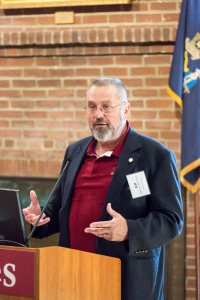College Key Newsletter — Spring 2017
Contents
Welcome from the President
Dear Members of the College Key,
I hope spring weather is finding you, wherever you are. As the temperature rises, our schedule is heating up, too. We are looking forward to Reunion and the Annual Meeting of the College Key in June.
More than 1,000 alumni and friends are expected to attend Reunion Weekend, June 9–11, 2017. This summer, the annual on-campus event celebrates class years ending in 2 or 7.
If this is your Reunion year, or if you are on campus that weekend for another reason, we hope to see you at the annual meeting on Friday, June 9, at 5 p.m. in the Benjamin E. Mays Center. Come a little early as a short reception will precede. At the meeting you will hear the President’s and Treasurer’s annual reports, confirm the new student and alumni members, witness the presentation of the Distinguished Service Award, elect a new secretary, and hear reports about all the College Key’s programs. We will get you out in time to attend the Reunion lobster bake. We hope to see you there!
On behalf of the Executive Committee, I am pleased to once again share with you the latest information about the student programs we support as members of the College Key. I hope you enjoy this issue of the Key newsletter and take pride in all the programs and services we support.
My best from Maine,
Jeff Sturgis ’69, President
Volunteer Thank You
Thank you to all who contacted us to volunteer your services for the College Key. The response was overwhelming. At this time, we have many more volunteers than we have vacant spots on our committees, so don’t be disappointed if we don’t call on you right away. We will maintain this list for use in the future. In addition, we have shared this list with the college and the Alumni Council, so you may be contacted to assist in other areas of greater need. In the meantime, another avenue for volunteering is as a class agent or as a member of your Reunion committee. We appreciate those of you who stepped forward to volunteer your time for the betterment of the College Key and Bates.
Distinguished Alumna in Residence:
Susan Dumais ’75
Susan Dumais ’75 visited the Bates campus Jan. 31—Feb. 2 as the College Key’s Distinguished Alumna in Residence. Susan graduated from Bates with a B.A. in mathematics and psychology, then completed a Ph.D. in cognitive and mathematical psychology from Indiana University. She is presently a distinguished scientist at Microsoft Corp. and the deputy managing director of the Microsoft Research Lab in Redmond, Wash., as well as an adjunct professor at the Information School at the University of Washington. Susan was chosen for this honor because of her leadership in the field of technology, and her visit to Bates was especially timely as Bates is in the early stages of implementing a new Digital and Computational Studies program. Susan enjoyed a tour of the campus expertly guided by Zeke Smith ’19, followed by lunch with student-members of the Technology and Video Game Clubs on campus. After an interview with Jay Burns, editor of Bates Magazine, Susan had dinner with nine faculty members from various departments who are involved in the startup of the new Digital and Computational Studies program. The highlight of her visit was her presentation, “Thinking Outside the (Search) Box,” at the Olin Arts Center. The following article from Bates Magazine includes her interview with Jay in which she discusses the central themes of her talk at Olin.
Microsoft’s Susan Dumais ’75: New Technology Can Come from Old Ideas
By Jay Burns — Published on February 15, 2017
When I ask about the weather, my smartphone chirps back an answer: “It doesn’t look so nice tomorrow.”
That’s doubly unsurprising. One, it’s February in Maine during a historic stretch of snowy weather. Two, a phone is supposed to answer questions.
But here’s a surprise. We tend to think that new ideas are the fuel for today’s technology. Yet voice recognition is one of the “many things that people have tried before that now work,” says Susan Dumais ’75, a Distinguished Scientist with Microsoft Research in Redmond, Wash.
A member of the American Academy of Arts and Sciences and the National Academy of Engineering, Dumais visited campus in February as the College Key’s Distinguished Alumna in Residence, meeting with students and giving a talk on Feb. 1.
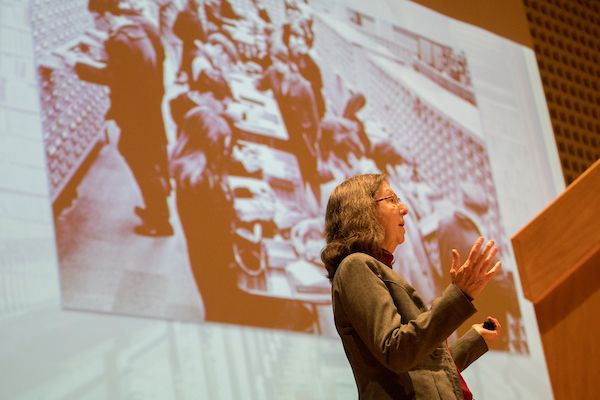
College Key Distinguished Alumna in Residence Susan Dumais ’75 gives a talk on Feb. 1 in the Olin Arts Center Concert Hall in front of an image showing a bygone way to retrieve information: the card catalog. (Phyllis Graber Jensen/Bates College)
Back in the 1980s, when Dumais was at Bell Labs, one ongoing project was to get a computer to recognize correctly whether “yes” or “no” was answered to the question, “Will you accept this collect call?”
“Years and years and years of work went into that,” Dumais says. The project did succeed in the 1990s (though collect calls are going the way of the typewriter).
So, what makes today’s “new” technology possible? She points to better computational models, more computational horsepower, and access to much richer data.
In the case of voice recognition, it means access to vast amounts of spoken language with corresponding transcriptions, which makes it “easier to map various acoustic features to the resulting words,” she says.
“So when you search for ‘Who is the best teacher?’ the results include pages that use the word ‘professor’ even if they don’t use the word ‘teacher.’”
Another old idea whose time has come belongs to Dumais herself. In 1990 — way before Google or Bing — she and fellow researchers developed an information retrieval process known as “latent semantic indexing.” In recent years, LSI-related ideas have “been a big splash,” she says.
That’s because LSI enables search engines to retrieve the information that we’re actually looking for. “So when you search for ‘Who is the best teacher?’ the results include pages that use the word ‘professor’ even if they don’t use the word ‘teacher,’ ” Dumais explains.
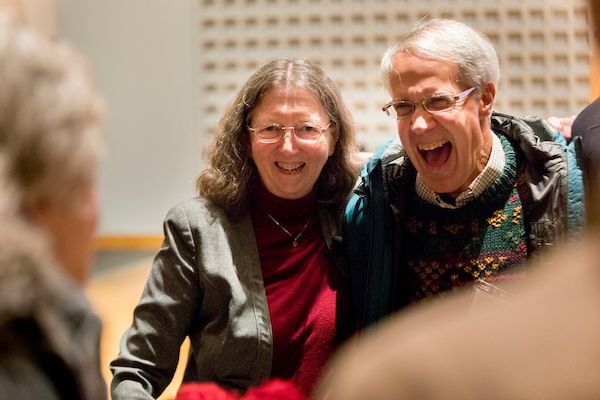
Susan Dumais ’75 laughs with Professor Emeritus of Psychology John Kelsey before her talk on Feb. 1. Dumais first met Kelsey in the 1970s when she was a doctoral student at the University of Indiana, where he was starting his faculty career. (Phyllis Graber Jensen/Bates College)
Simply put, LSI helps a search engine respond to queries by “discovering words that are semantically the same even though they aren’t literally the same,” she says.
The idea existed 25 years ago but “the time wasn’t right,” she says. Today, computers can swiftly learn these more nuanced word relationships thanks to the availability of much larger collections of text and more powerful computational resources.
Though advances in computing power are turning yesterday’s ideas into today’s tools, the demands of today’s tools are also keeping those ideas viable.
“How we use this technology — such as everyone carrying a smartphone — makes these ideas even more necessary now,” Dumais says.
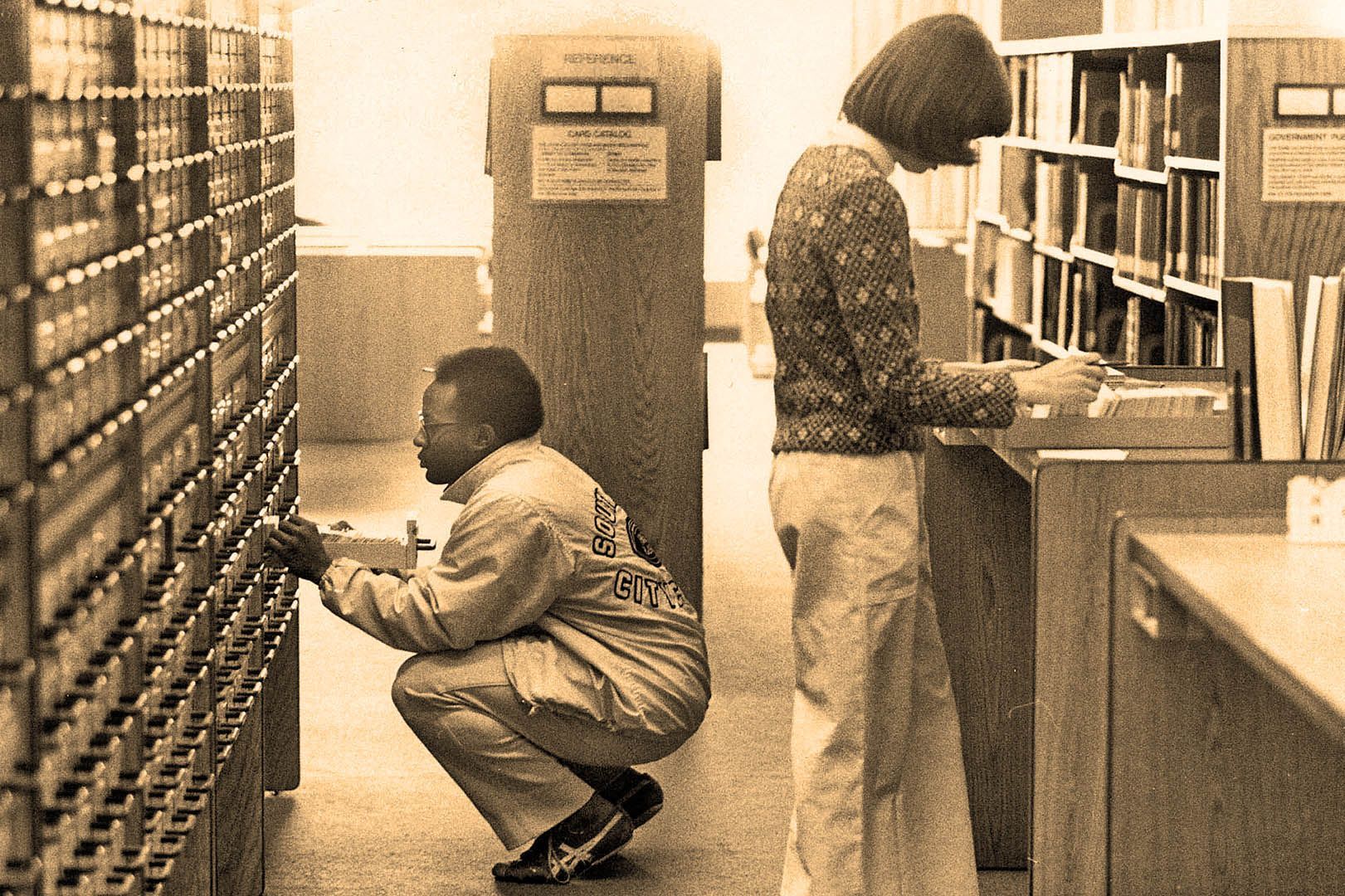
Students do pre-computer information retrieval, circa 1974, using the library’s card catalog. (Muskie Archives and Special Collections Library)
Winter Coat Fund
Once again the College Key has provided money for coats for needy Bates students who come from warmer climes, both in this country and abroad. The $2,500 donated by the College Key is administered by Josh McIntosh, vice president for student affairs and dean of students. Josh invited College Key President Jeff Sturgis to his house in February for dinner with students who were recipients of the grants from the Key’s Winter Coat Fund. Without exception, the students who were there had never seen snow or even a frozen pond or lake. They were all grateful for the assistance they received and wrote heartfelt thank-you notes to the College Key for its help.
“I just want to say thank you. Thank you for your generosity. It takes people with great hearts to help out people in need, so it means so much to me that you’re willing to do this for us. Gestures like this are what motivate me to work hard and put effort into what I’m doing to be able to help people out just the way you did with me. God bless you. — Bates Student ’20
Growing up in a tropical country like Bangladesh, I was always fascinated about snow. Now that I am here at Bates and experienced my first snow, the winter apparel is keeping me warm as I enjoy these days to their fullest. Thank you for the authentic Bates experience. — Bates Student ’20
Jeff reports that it was a wonderful evening. Seeing the tangible results of this important program supported by the College Key was gratifying. The students had impressive goals and aspirations for their futures and will be great representatives of the college, both during their student days and later, when they join the alumni body. All of the notes from Winter Coat Fund recipients will be available for members to read at the annual meeting.
College Key Travel Funds at Work
At the annual Mount David Society Luncheon on March 31, Bantu Mabaso ’18 of Swaziland delivered a captivating speech lauding Bates philanthropy.
Serving as an Office of Intercultural Education Fellow, Community Liaison Officer for the Bates Africana Club, and a Junior Advisor in the Office of Residence Life in her sophomore year sparked an interest in community development initiatives. The following excerpt from Bantu’s speech highlights her pet project, Phalala Youth Empowerment for Food Security in Swaziland, and outlines one of the many ways College Key funds offer once-in-a-lifetime opportunities to Bates Students. (A video clip of her full speech follows the excerpt.)
I began to design and implement a food security project that would work collaboratively with farming communities in rural Swaziland to increase their food supply by incorporating climate-proofing in their own farming practices to combat food shortages caused by severe drought as a result of climate change. I was lucky enough to receive a Davis Projects for Peace grant through the Harward Center for Community Partnerships to do so. I used my experiences building relationships at Bates to work in partnership with the Swazi Ministry of Agriculture to design a skills-based curriculum that teaches farmers about climate-resilient farming. I also facilitated the construction of a learning centre where field officers attached to the project by the ministry would provide tutelage and mentorship to a cohort of 30 farmers at a time. I also worked with local chiefs to acquire 54 acres of farmland, as the sustainability of the program would be dependent on participants having access to land on which they could farm using these new methods.
Upon completion of the project I was invited to represent my work at the Clinton Global Initiative University meeting at UC Berkeley in California as an exemplary approach to solving hunger, a world challenge. My trip to the conference was made possible by the College Key Fund through the Bates Career Development Center.
Speaking to a room full of hundreds of young people like me with great conviction about my work, and meeting development practitioners from all over the world confirmed my desire to work in development. This inspired my decision to spend the last semester as a visiting student studying International Development and Humanitarian Aid at the University of Edinburgh in Scotland.
My story is just one example of your contribution to Bates’ ability to support students in the pursuit of the things that they are passionate about. Because of the financial support that so many of you have generously offered, I have been afforded opportunities to pursue my interests in ways that I never thought possible and my life has been enriched tremendously because of it. The opportunity to come to Bates continues to mean a lot to me, my family and my country. It has made me truly appreciate the power of philanthropy as a tool for making a positive impact in the world that will resonate with future generations. Thank you for making this great experience possible.
To date, almost all of the $10,000 in College Key travel funding awarded to BCDC has been allocated to students participating in the Career Discovery in Practice (CDIP) job shadow program. Some funding has been reserved to assist students needing help with expenses for travel to interviews and summer internships. College Key’s support made it possible for students to complete job shadows with alumni and parents at Google, a Stanford University biology lab and Giant Creative Strategy in California, a child welfare and behavioral health organization in New Mexico, an artist’s studio in New York City, the Centers for Disease Control in Atlanta, and a medical office in Maine. Students also traveled to a job interview in New York City and a conference in Washington, D.C.
The College Key Gets Social
We are excited to announce two new avenues for College Key members to connect with us: a Facebook group and a LinkedIn group. Our Facebook group will provide a forum to share updates, exciting initiatives, and other important work with both the College Key and the college. This group is private so information will remain within the group, and only College Key members will have eligibility to join. We encourage all members to request to join the group by clicking on the following link: https://www.facebook.com/groups/batescollegekey/
The Bates College Key group on LinkedIn will serve as a more professional platform for networking and sharing interesting work by our Key members. We wanted to offer this option as we look to expand opportunities for fellow Key members to connect with each other as careers grow, shift, and change. We encourage members to join the group by clicking on the following link: https://www.linkedin.com/groups/8601015
If you have any questions or would like more information, please do not hesitate to contact Karen Finocchio Lubeck ’92.
2017 Annual Meeting Reminder
If you are in the Bates College campus vicinity on Friday, June 9, during Reunion, we warmly encourage you to attend the annual meeting of the College Key at 5 p.m. in the Benjamin E. Mays Center.
At the meeting, we’ll welcome student and alumni members to the Key, present the Distinguished Service Award — the Key’s highest honor — learn about programs of the Key, and conduct the organization’s annual business.
The meeting is followed by the annual Reunion lobster bake — another great reason to come back to campus! If you are not in a Reunion class but would like to attend all or parts of the Reunion, you can register online or contact the Bates Reunion Team at 207-755-5976 or reunion@bates.edu. We hope you can join us!
Senior Class Bates Fund Gift
Once again, the College Key is providing matching funds for the senior gift to encourage Bates seniors to start thinking of ways to give back to their alma mater after graduation. The College Key is providing $2,500 for matching gifts for the first 25 Mount David Society level gifts ($100 for seniors) given by members of the Class of 2017. There are now nine members of the class who have given at the Mount David Society level, with 18 percent of the class participating so far. During the recent Alumni Council meetings, I was part of a subcommittee that met with the Senior Gift Co-Chairs, Susan Leonard and Matt Phillips. They are dynamic and conscientious leaders, and they expressed their appreciation to the College Key for presenting this challenge to their class.
College Key Dues
Secure and Simple Online Donations
If you are an avid user of a mobile device, pay your bills online, or shop online, then please consider paying your College Key dues online as well. Paying online is the perfect complement to our move to electronic newsletters.
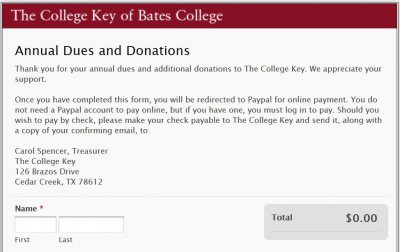 We’ve created a secure online form that you can reach from the “Donate” button on our web page. You will receive a confirmation email indicating the amount of your donation and we’ll get one letting us know that you’ve donated. This form saves your data so we can upload it directly into QuickBooks instead of entering it manually. You can pay dues and donate specific amounts to individual College Key projects.
We’ve created a secure online form that you can reach from the “Donate” button on our web page. You will receive a confirmation email indicating the amount of your donation and we’ll get one letting us know that you’ve donated. This form saves your data so we can upload it directly into QuickBooks instead of entering it manually. You can pay dues and donate specific amounts to individual College Key projects.
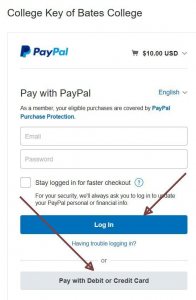 When you click “Donate,” the form takes you straight to PayPal where you’ll be prompted to log in.
When you click “Donate,” the form takes you straight to PayPal where you’ll be prompted to log in.
If you have a PayPal account, you’ll have to use one of the payment methods in your account or your PayPal balance.
If you don’t have a PayPal account or don’t want one, no problem. PayPal provides a link to pay by debit or credit card without setting up an account.
We understand that some will still want to pay by check. To do so, please fill out the online form, then close the PayPal window without entering any data. Print the email confirming the amount of your donation and include it with your check. Our data will indicate that your donation is not complete. Once we receive your check, we will update your donation record.
PayPal does not grant the College Key access to your credit card information. It does, however, save precious financial resources otherwise lost to mandatory, annual, credit card PCI compliance.
If you have any questions about dues or donations, please contact the College Key treasurer, Carol Prochazka Spencer. Your dues and donations allow us to provide important services to Bates students and we thank you!
Executive Committee 2016–17 Officers
- President, Jeff Sturgis ’69
- Vice President, Karen Finocchio Lubeck ’92
- Recording Secretary, Courtney Fleisher ’94
- Treasurer, Carol Prochazka Spencer ’74
- Immediate Past President, Kristin Barber ’07
- Corresponding Secretary, Cary Gemmer ’07, Director of Alumni & Family Engagement
- Staff Liaison Support, Penney Ward, Office Manager, Annual Giving
- Advisor, Marianne Nolan Cowan ’92
